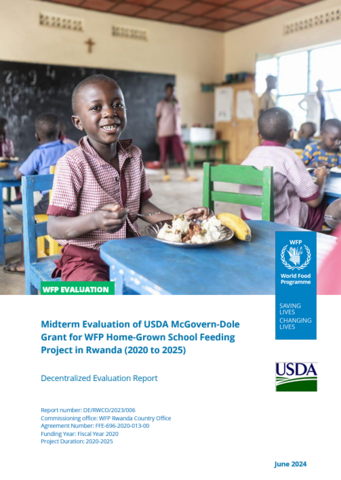
The evaluation was commissioned to inform Phase II implementation and support the rollout of the national school feeding programme in Rwanda, with a dual purpose of accountability and learning. The decentralized midterm evaluation was carried out in 2023/2024, the baseline in 2021/2022.
Phase II of the McGovern-Dole grant provides USD 25 million over five years, aiming to improve literacy in school-age children, increase the use of health and dietary practices and improve the effectiveness of food assistance through local and regional procurement. An overarching objective is to strengthen government capacity at national, district and school levels to manage the National School Feeding Programme (NSFP).
The programme supports the direct implementation of school meals, WASH, health and nutrition, education and infrastructure activities in 140 pre- and primary schools in seven districts. Primary data collection for the midterm included school and teachers surveys as well as an early grade reading assessment (EGRA) among students, through a representative sample of 31 HGSF schools in the seven implementation districts and 10 control schools.
Key conclusions:
- The programme is relevant to the education, food security and nutrition, health and literacy needs of its intended beneficiaries, to national policies, and to the types of support the Government needs to implement Rwanda’s NSFP.
- At midterm, good progress has been made towards overall objectives. The quality of activities is recognized by participants and key stakeholders. Literacy instruction has improved in project schools, and parent engagement and contributions have increased. All schools have established an improved water source and handwashing stations. Progress has been made to strengthen the capacity and governance of smallholder farmer cooperatives and establish linkages with schools.
- The COVID-19 pandemic, staff turnover and gaps, and global food price increases were the main factors impacting programme implementation and efficiency. Appropriate systems and processes are in place for adaptive management.
- While steps have been taken to incorporate gender sensitization into teacher training and community outreach activities, GEWE interventions are a limited focus of the programme design.
- The programme has positively impacted targeted beneficiaries and made significant contributions to overall objectives for school feeding in Rwanda. WFP has leveraged its strong relationships with the Government and programme knowledge, resources and experience to strengthen government capacity and systems.
- Progress has been made in facilitating inter-ministerial collaboration necessary for scale-up and success, and in helping to ensure adequate resourcing. The transition of McGovern-Dole schools to the NSFP is on track, though partners note that a phased approach would have been better, rather than graduating all programme schools at once.
Recommendations were operational (such as strengthen transition support for specific groups of schools; strengthen monitoring, particularly on gender, disability inclusion and country capacity strengthening; strengthen focus on disability inclusion in the NSFP; develop a learning strategy to cover the HGSF project and the NSFP) and strategic (such as bolster district capacity strengthening for NSFP and develop a HGSF technical support function to the NSFP).
